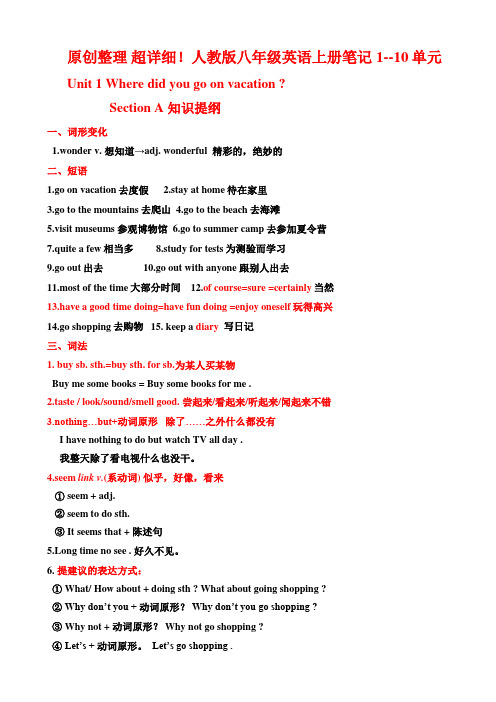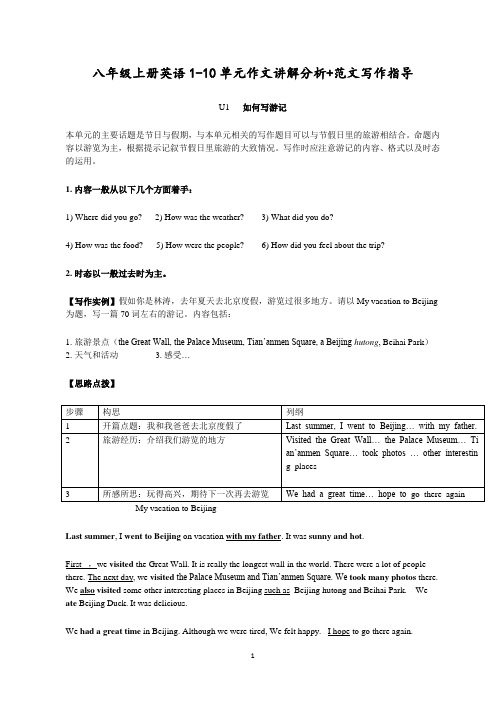八年级上册英语1-10单元短语语法句型及作文整理
八年级上各单元短语、句型及单元话题范例作文

八年级上各单元短语、句型及单元话题范例作文Unit 1 How often do you exercise?一、短语及句型1. go to the movies = go to the cinema = see a film 看电影2. look after = take care of = babysit 照顾3. surf the Internet 上网4. healthy lifestyle 健康的生活方式5. go skateboarding 去划板6. (be) in good health =(be)healthy 身体健康7. keep / stay healthy = keep / stay in good health 保持健康8. as for 至于9. take / do exercise = play / do sports 锻炼,做运动10. eating habits 饮食习惯11. be the same as 与……相同12. once a month 一月一次13. be different from 不同14. twice a week 一周两次15. make a difference to 对什么有影响16. how often 多久一次17. hardly ever 几乎不18. most of the students = most students 大多数学生19. activity survey 活动调查20. go shopping = do some shopping 购物21. do homework 做家庭作业22. do housework 做家务事23. junk food 垃圾食物24. be good/bad for 对……有益(害)25. on / at weekends 在周末26. want to do sth. = would like to do sth. = feel like doing sth. 想要做某事27. want sb. to do sth.= would like sb. to do sth. 想要某人做某事28. try to do sth 尽量做某事try doing sth.试着做某try one's best to do sth. 尽力做某事29. come home from school 放学回家30. of course = certainly = sure 当然31. get good grades 取得好成绩32. help sb. ( to )do sth. 帮助某人做某事33. help sb. with sth. 在某方面帮助某人34. a lot of = lots of = many + 可数名词。
2013新版新目标八年级上册英语1-10单元短语语法句型及作文整理

5 Do you want to a game show?短语:find out be ready to dress up take sb. place do a good job think of game show learn from talk show soap operago on watch a movie one of….. watch a movie try one’s besta pair of as famous as look like around the worldhave a discussion about one day such as a symbol of something enjoyable interesting information句型:----What do you think of talk shows?----I don’t mind them.I hope to be a TV reporter one day.How about you?常用法:let sb. do sth. plan to do sth. hope to do sth. happen to do sth. expect to do sth. How about doing……be ready to do sth. try one’s best to do sth.3.find out 查明,弄清楚,find 找到Please find out when Mrs Green will go to Beijing.4. go on 发生,与take place 同义I wonder what was going on.翻译:隔壁发生了什么??happen v.发生,一般指偶然发生,主语为事,不能为人。
Sth + happens to sb. A traffic accident happened to his elder brother yesterday.Sth + happens + 地点/时间,意为:某地/某时发生了某事An accident happened on Park Street.happen v,表示“碰巧”,主语可以是人,后常跟动词不定式to,表示“碰巧……”.Sb + happens to do sth.I happened to see my uncle on the street.* take place 意为“发生,举行,举办”,一般指非偶然性事件的“发生”,即这种事件的发生一定有某种原因或事先的安排。
(完整版)人教版八年级英语上册各单元知识点归纳和作文范文

新课标八年级上册英语单元知识点归纳Unit1 Where did you go on vacation?短语归纳1.go on vacation去度假2.stay at home待在家里3.go to the mountains去爬山4.go to the beach去海滩5.visit museums 参观博物馆6.go to summer camp去参加夏令营7.quite a few相当多8.study for tests为测验而学习9.go out出去10.most of the time大部分时间11.have a good time doing=have fun doing =enjoy oneself玩得高兴12.of course=sure =certainly当然13.feel like给……的感觉;感受到14.go shopping去购物15.in the past在过去16.walk around四处走走17.because of+名词短语:因为because+句子18. a/one bowl of…一碗……19. the next day第二天20.drink tea喝茶21.find out找出;查明22.go on继续23.take photos照相24.something important重要的事25.up and down上上下下e up出来come out 出版发行27.go out with anyone 跟别人出去28.say about 发表对…看法29.rain hard 雨下得大30.too much+不可数名词太多too many+可数名词复数太多much too+形容词太用法:1.buy sth. for sb. / buy sb. sth.为某人买某物2.taste / look/sound/smell good. 尝起来/看起来/听起来/闻起来不错3.nothing…but+动词原形除了……之外什么都没有4.seem+(to be)+ adj. 看起来……5.arrive in+大地点/ arrive at+小地点/get to +地点/reach +地点到达某地6.decide to do sth.决定去做某事7.try doing sth.尝试做某事/ try to do sth.尽力去做某事8.forget doing sth.忘记做过某事/ forget to do sth.忘记做某事9.enjoy doing sth.喜欢做某事10. want to do sth.想去做某事11.start doing sth.开始做某事12.stop doing sth. 停止做某事13.dislike doing sth. 不喜欢做某事14.keep doing sth.继续做某事keep on doing sth 不停做某事15.Why not do. sth.=why don’t you do sth为什么不做……呢?16.so+adj.+that+从句如此……以至于……17.tell sb. (not) to do sth. 告诉某人(不要)做某事18.enough +名词,形容词+enough19.not really .真的没有。
人教版英语八年级上册第一单元至第十单元知识点、重点笔记

Unit 1 where did you go on vacationImportant phrases: (重点短语)1.去夏令营2.买一些特别的东西3.为考试准备4.跟某人外出5.去纽约市6.好久不见7.度假8.去某个有趣的地方9.大多数时间10.给母鸡喂食11.除—一无所有12.当然,自然13.似乎有点无聊14记日记15.令人愉快地活动16.到达17.决定去海边18.尝试滑翔伞运动19.感觉像一只小鸟20.想要骑车21.中国商人的房子22.在过去23许多古老的建筑24步行到山顶25.开始下雨26.等了一个多小时的火车27.下大雨28.忘记带一把雨伞29.又湿又冷30.因为恶劣的天气31.带着足够的钱32.足够大33.好像有点饿34.与—一样好35 不如----好36.照了相当多的相片37.停下来喝水38.继续前进39.激动地跳跃40.二十分钟后41.如此---以至于42.升起43.发现-- 44.尝起来很好吃45.尽力去做某事46.停止做某事47.不喜欢做某事48.继续做某事49.一碗米饭50为某人买某物重点句子where did you go on vacation?go on vacation 去度假2.Visited my uncle重点:visit为及物动词,“拜访,探望,参观,游览”后接人或地点改错Did you visit in china?3. Did you buy anything special?1)buy 的过去式为boughtbuy sth.for sb.=buy sb sth.我为Tom买了一个礼物2)anything 不定代词“某物,某事”主要用于疑问句和否定句中一旦anything用于可定句中,则意为“任何事,任何东西”Eg You can ask me anything you want to know3)★形容词修饰不定代词要后置4.Oh,did you go anything interesting?这是一般过去时中不含was/were的句子在变一般疑问句时,需用助动词did。
人教版八年级英语上册笔记1--10单元(原创整理,超详细)

原创整理超详细!人教版八年级英语上册笔记1--10单元Unit 1 Where did you go on vacation ?Section A 知识提纲一、词形变化1.wonder v. 想知道→adj. wonderful 精彩的,绝妙的二、短语1.go on vacation去度假2.stay at home待在家里3.go to the mountains去爬山4.go to the beach去海滩5.visit museums 参观博物馆6.go to summer camp去参加夏令营7.quite a few相当多 8.study for tests为测验而学习9.go out出去 10.go out with anyone 跟别人出去11.most of the time大部分时间 12.of course=sure =certainly当然13.have a good time doing=have fun doing =enjoy oneself玩得高兴14.go shopping去购物 15. keep a diary 写日记三、词法1. buy sb. sth.=buy sth. for sb.为某人买某物Buy me some books = Buy some books for me .2.taste / look/sound/smell good. 尝起来/看起来/听起来/闻起来不错3.nothing…but+动词原形除了……之外什么都没有I have nothing to do but watch TV all day .我整天除了看电视什么也没干。
4.seem link v.(系动词) 似乎,好像,看来① seem + adj.② seem to do sth.③ It seems that + 陈述句5.Long time no see . 好久不见。
6. 提建议的表达方式:① What/ How about + doing sth ? What about going shopping ?②Why don’t you + 动词原形?Why don’t you go shopping ?③ Why not + 动词原形? Why not go shopping ?④Let’s + 动词原形。
八年级上册英语笔记1~10单元

八年级上册英语笔记(1 - 10 单元)一、Unit 1 Where did you go on vacation?(一)重点词汇1.anyone /ˈeniwʌn/ 任何人-解析:用于疑问句和否定句中,表示“任何人”。
-例句:Did anyone see my keys?(有人看到我的钥匙了吗?)2.wonderful /ˈwʌndəfl/ 精彩的;极好的-解析:形容事物非常好,令人愉悦。
-例句:We had a wonderful time on vacation.(我们在假期里过得非常愉快。
)3.few /fjuː/ 很少;几乎没有-解析:修饰可数名词,表示数量少。
-例句:There are few people in the park today.(今天公园里人很少。
)4.quite a few 相当多;不少-解析:强调数量比较多。
-例句:I took quite a few photos on my trip.(我在旅行中拍了不少照片。
)5.most /məʊst/ 大多数;大部分-解析:可作形容词、名词或副词。
-例句:Most people like to travel.(大多数人喜欢旅行。
)(二)重点句型1.Where did you go on vacation? 你去哪里度假了?-解析:这是一个特殊疑问句,询问过去的动作。
-例句:Where did you go last weekend?(你上周末去哪里了?)2.Did you go anywhere interesting? 你去了什么有趣的地方吗?-解析:一般疑问句,用“Did + 主语+ 动词原形”的结构。
-例句:Did you do anything special yesterday?(你昨天做了什么特别的事情吗?)3.I went to the mountains. 我去了山区。
-解析:简单的陈述句,表达过去的动作。
八年级英语第1至10单元期末重点句型汇总

八年级英语第1至10单元期末重点句型汇总八上英语Unit1~10重点句型汇总Unit 1 Where did you go on vacation?【重点句型】1、——Where did you go on vacation? 你到哪里去度假了?——I went to New York City. 我去了纽约城。
2、——Did you go out with anyone? 你出去带人吗?——No, No one was here. Everyone was on vacation.不,没有人在这儿。
大家度去度假了。
3、——Did you buy anything special? 你买了什么特别的东西吗?——Yes, I bought something for my father.对,我给父亲买了一些东西。
4、——How was the food? 食物怎么样?——Everything tasted really good.每一样东西真的都好吃。
5、——Did everyone have a good time?大家玩的开心吗?——Oh, yes. Everything was excellent.对,一切都很精彩。
6、There was nothing much to do in the evening but read.晚上除了读书以外无事可做。
Unit 2 How often do you exercise?【重点句型】1、I go to the movies maybe once a month.我可能一个月看一次电影。
2、——How often does he watch TV? 他多久看电视一次?——He hardly ever watches TV.他几乎不看电视。
3、——Do you go shopping? 你购物吗?——No, I never go shopping.不,我从来就不购物。
八年级上册英语1-10单元作文讲解分析+范文写作指导

八年级上册英语1-10单元作文讲解分析+范文写作指导U1 如何写游记本单元的主要话题是节日与假期,与本单元相关的写作题目可以与节假日里的旅游相结合。
命题内容以游览为主,根据提示记叙节假日里旅游的大致情况。
写作时应注意游记的内容、格式以及时态的运用。
1. 内容一般从以下几个方面着手:1) Where did you go? 2) How was the weather? 3) What did you do?4) How was the food? 5) How were the people? 6) How did you feel about the trip?2. 时态以一般过去时为主。
【写作实例】假如你是林涛,去年夏天去北京度假,游览过很多地方。
请以 My vacation to Beijing 为题,写一篇70词左右的游记。
内容包括:1. 旅游景点(the Great Wall, the Palace Museum, Tian’anmen Square, a Beijing hutong, Beihai Park)2. 天气和活动3. 感受…【思路点拨】U2调查报告本单元的话题是“课余活动”,围绕这一话题谈论从事某一活动的频率。
在写作方面,要求写一篇有关日常活动的调查报告。
写作时,开篇点题,即点出调查报告的主题和对象;其次,要对调查报告的内容展开分述,要正确使用频度副词及次数的表达;结尾要进行综述以表达中心观点。
【写作实例】根据下面八年级八班学生的活动调查表,用英语写一篇调查报告。
Class 8, Grade 8: Activity surveyActivity Every Day Once or twice a Week Three or four times a Week Watch TV90%10%0%Use the Internet 80%0%20%Play sports 30%20%50%【思路点拨】“总分总法”写关于调查报告类的作文U3 人物特征本单元以“人物个性特征”为话题,向我们展示了如何谈论人物特征如外貌特征(tall; short; thin; heavy; long/short hair等)、个性特点(outgoing; funny; friendly; hardworking; smart等)等,如何运用比较级来对人物进行比较,具体到书面表达中,要求同学们会根据所学内容来描写人物之间的相同点和不同点。
- 1、下载文档前请自行甄别文档内容的完整性,平台不提供额外的编辑、内容补充、找答案等附加服务。
- 2、"仅部分预览"的文档,不可在线预览部分如存在完整性等问题,可反馈申请退款(可完整预览的文档不适用该条件!)。
- 3、如文档侵犯您的权益,请联系客服反馈,我们会尽快为您处理(人工客服工作时间:9:00-18:30)。
Unit 1 Where did you go on vacation? 惯用法:1. buy sth for ab./ buy sb. sth 为某人买某物2. taste + adj. 尝起来……3. nothing ….but + V.(原形) 除了……之外什么都没有4. seem + (to be) + adj 看起来5. arrive in + 大地方/ arrive at + 小地方到达某地6. decide to do sth. 决定做某事7. try doing sth. 尝试做某事/ try to do sth. 尽力做某事8. enjoy doing sth. 喜欢做某事9. want to do sth. 想去做某事10. start doing sth. 开始做某事11. stop doing sth. 停止做某事12. look + adj 看起来13. dislike doing sth. 不喜欢做某事14. Why not do sth. 为什么不做…….呢?15. so + adj + that + 从句如此……以至于……16. tell sb. (not) to do sth. 告诉某人(不要)做某事17. keep doing sth. 继续做某事The hat is much too big for me. You’re walking much too fast.分辨三者的口诀:too much, much too, 用法区别看后头:much 后接不可数,too 后修饰形或副。
too many 要记住,后面名词必复数。
7. because of 介词短语,因为,因为,后接名词、代词或动名词,不能接句子。
He can’t take a walk because of the rain.because 连词,因为,引导状语从句,表示直接明确的原因或理由。
I don’t buy the shirt because it was too expensive.不定代词anyone ,something, anything, everything, nothing, everyone ,no oneComposionWhat a difference a day makes! My father and I decided to go to Penang Hill today. We wanted to walk up to the top, but then it stared raining a little so we decided to take the train. We waited over an hour for the train because there were too many people. When we got to the top, it was raining really hard. We didn’t have an umbrella so we were wet and cold. It was terrible! And because of the bad weather, we couldn’t see anything. My father didn’t bring enough money, so we only had one bowl of rice and some fish. The food tasted great because I was so hungry!Unit 2 How often do you exercise?惯用法:1. help sb. with sth 协助某人做某事2. How ab out…?….怎么样?/ ….好不好?3. want sb. to do sth. 想让某人做某事4. How many + 可数名词复数+ 一般疑问句….有多少…..5. 主语+ find+ that 从句…发现…6. It’s + adj.+ to do sth. 做某事是….的7. spend time with sb. 和某人一起度过时光8. ask sb. about sth. 向某人询问某事9. by doing sth. 通过做某事10. What’s your favorite…..?你最喜欢的……是什么?11 start doing sth. 开始做某事What do you usually do on weekends? I always exercise.What do they do on weekends? They often help with housework.What does she do on weekends? She sometimes goes shopping.How often do you go to the movies? I go to the movies maybe once a month.How often does he watch TV? He hardly ever watches TV.Do you go shopping? No, I never go shopping.词语辨析:1. how often 多久一次,用来提问动作发生的频率。
回答用:once,twice, three times 等词语。
How often do you play sports? Three times a week.how long 多长,用来询问多长时间,也可询问某物有多长。
How long does it take to get to Shanghai from here? How long is the ruler?how for 多远,用来询问距离,指路程的远近。
How far is it from here to the park? It’s about 2kilometers.2.free 空闲的,有空的,反义词为busy. be free 有空,闲着,相当于have time.I’ll be free next week. = I’ll have time next week.还可作“免费的、自由的”解。
be free to do sth. 自由地做某事。
The tickets are free. You’re free to go or to stay.3.How come?怎么会?怎么回事?表示某件事情很奇怪,有点想不通;可单独使用,也可引导一个问句,相当于疑问句why, 但how come 开头的特殊疑问句使用的仍然是陈述语序。
How come Tom didn’t come to the party? = Why didn’t Tom come to the party?4.stay up late 指“熬夜到很晚,迟睡”。
Don’t stay up late next time.stay up 指“熬夜,不睡觉”。
He stayed up all night to write his story.5.go to bed 强调“上床睡觉”的动作及过程,但人不一定睡着。
I went to bed at eleven last night.go to sleep 强调“入睡,睡着,进入梦乡”。
She was so tired that she went to sleep soon.6.find + 宾语+名词, 发现:We have found him (to be) a good boy.find + 宾语+ 形容词,发现:He found the room dirty.find + 宾语+ 现在分词,发现:I found her standing at the door.7.percent 百分数,基数词+ percent:percent 没有复数形式,作主语时,根据所修饰的名词来判断谓语的单复数。
Forty percent of the students in our class are girls. Thirty percent of time passed.8.more than 超过,多于,不但仅,相当于over. 在句型转换中考查两者的同义替换。
反义词组为:lessthan. I lived in Shanghai for more than / over ten years.9.be afraid of sb / sth 害怕某人/ 某事;be afraid of doing sth. 害怕做某事。
Some children are afraid of the dark. Don’t be afraid of asking question.I’m afraid + 从句,恐怕,担心:I’m afraid I have to go now.10. sometimes , sometime, some times , some time 的区别:sometimes 频度副词,有时。
表示动作发生的不经常性,多与一般现在时连用,可位于句首、句中或句末。
Sometimes I get up very early. ------How often do you get up?sometime 副词,某个时候。
表示不确切或不具体的时间,常用于过去时或将来时,对它用疑问词when.I will go to Shanghai sometime next week. ------When will you go to Shanghai next week?some times 名词词组,几次,几倍。
其中time 是可数名词,对它提问用how many times.I have read the story some times. -------How many times have you read the story?some time 名词短语,一段时间. 表示“一段时间”时,句中谓语动词常为延续性动词,提问时how longWhat do No. 5 High School Students do in their free time?Last month we asked our students about their free time activities. Our questions were about exercise., use of the Internet and watching TV. Here are the results.We found that only fifteen percent of our students exercise every day. Forty-five percent exercise four to six times a week. Twenty percent exercise only one to three times a week. And twenty percent do not exercise at all!We all know that many students often go on-line, but we were surprised that ninety percent of them use the Internet every day. The other ten percent use it at lease three or four time a week. Most students use it for fun and not for homework.Unit 3 I’m more outgoing than my sister句型:Both Sam and Tom can play the drums, but Sam plays them better than Tom.That’s Tara, isn’t it?Are you as friendly as your sister?I’m shy so it’s not easy for me to make friends.1. have fun doing sth. 享受做某事的乐趣2. want to do sth. 想要做某事3. as + 形容词或副词的原级+ as 与…一样…4. be good at doing sth 擅长做某事5. make sb. Do sth. 让某人做某事6. It’s+形容词+ for sb. To do sth.. 对某人来说,做某事是……的语法知识:Is Tom smarter than Sam? No,he isn’t. Sam is smarter than Tom.Is Tara more outgoing than Tina? No, she isn’t. Tina is more outgoing than Tara.Are you a friendly as your sister? No, I’m not. I’m friendlier.Does Tara work as hard as Tina? Yes, she does.Who’s more hardworking at school? Tina thinks she works harder than me.语法讲解:形容词与副词的比较级绝绝大部分形容词(性质形容词)和副词有比较级和最高级的变化,即原级、比较级和最高级,用来表示事物的等级差别。
